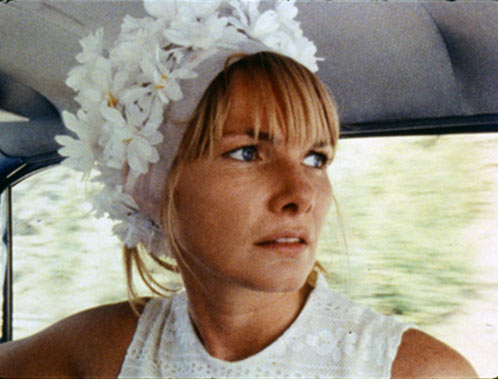|
Genres, Themes, Actors, and Directors:
- Character Studies
- Feminism and Women’s Issues
- Heists
- Mining Towns
- Road Trip
Response to Peary’s Review:
This slow, honest film — regarded as “an interesting failure” upon its release — tells of a “passive, unskilled, uneducated, unambitious” woman with little sense of personal worth or agency. The satisfaction Wanda (Loden) finds in assisting her new lover (Higgins) with a bank heist shows how desperately this demoralized woman longs to prove her utility in some way. You’ll be frustrated and saddened when watching Wanda passively accept “the hostility, insults, and demands” placed upon her by Higgins (a total loser), but also intrigued by what will happen next. Indeed, as Peary notes, the grainy film — shot in 16 mm — has “the look and feel of a documentary” made with a hidden camera, thus adding to the feeling that one is watching “real life” unfolding, frame by frame.
Redeeming Qualities:
- Barbara Loden’s understated performance as Wanda

Must See?
Yes, for its historical importance.
Categories
(Listed in 1001 Movies You Must See Before You Die)
Links:
|
One thought on “Wanda (1971)”
Yes, a must. A classic of independent cinema.
Though director/star Loden made a unique film with a personal stamp, one can see the influence of Elia Kazan and even John Cassavetes. Some may have trouble with the deliberate pacing but, as ‘Wanda’ progresses, it becomes clearer that it feels quite right. There is something of a plot – well, Higgins’ character has an objective – but we’re always reminded that the film is a study of two desperate people (one actively so, one quietly).
Which is why a number of details are of little importance: we don’t know whether Wanda’s husband cheated on her or was driven to that; we don’t know why Higgins (in a complex role) smiles when Loden reads the newspaper account of a robbery, citing them as “the couple”, etc.
Near the end, someone asks the aimless Wanda, “You waitin’ for somebody?” Wanda is always waiting for somebody – someone to give her direction. The terrific final image suggests Wanda is reflecting on her life – but, again, we’re not sure. This is a woman who seems to have never reflected on anything at all.
Cross-references (two other musts): Coppola’s somewhat-similar ‘The Rain People’ (made two years earlier); Loden’s terrific polar-opposite performance in Kazan’s ‘Splendor in the Grass’.